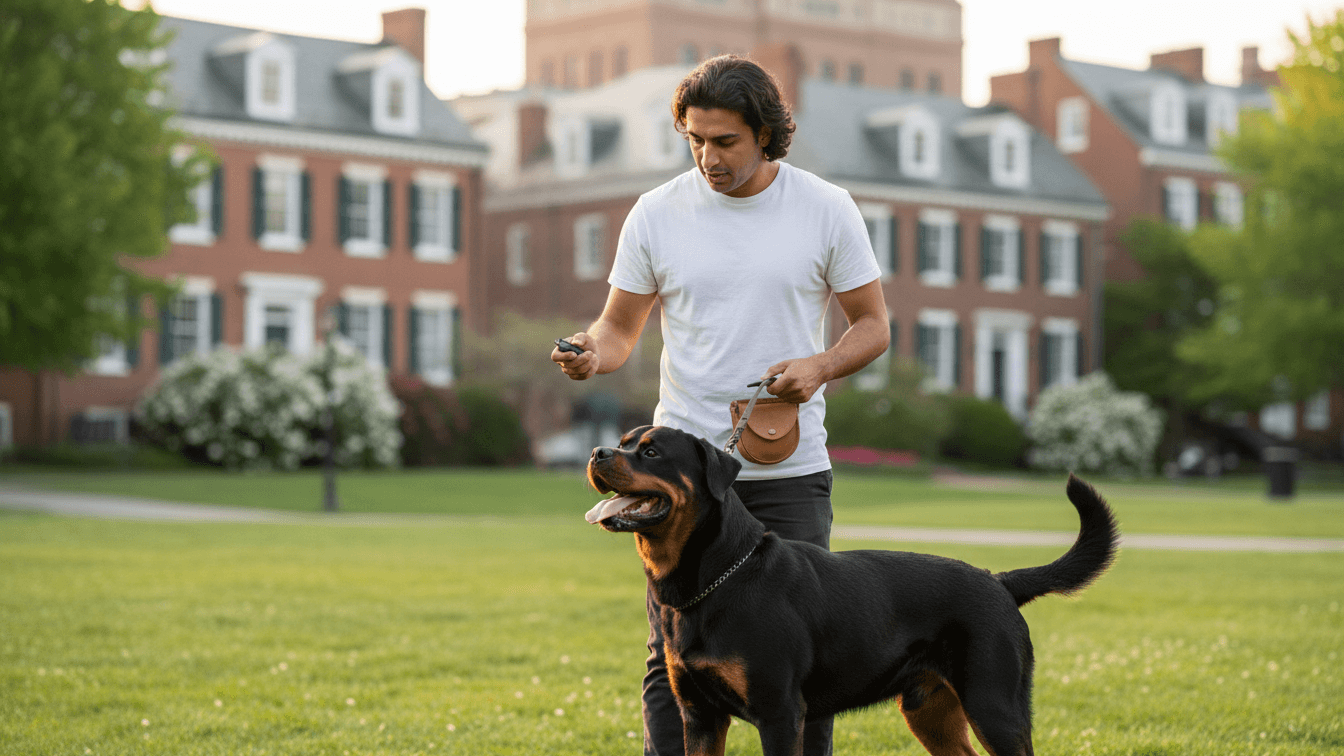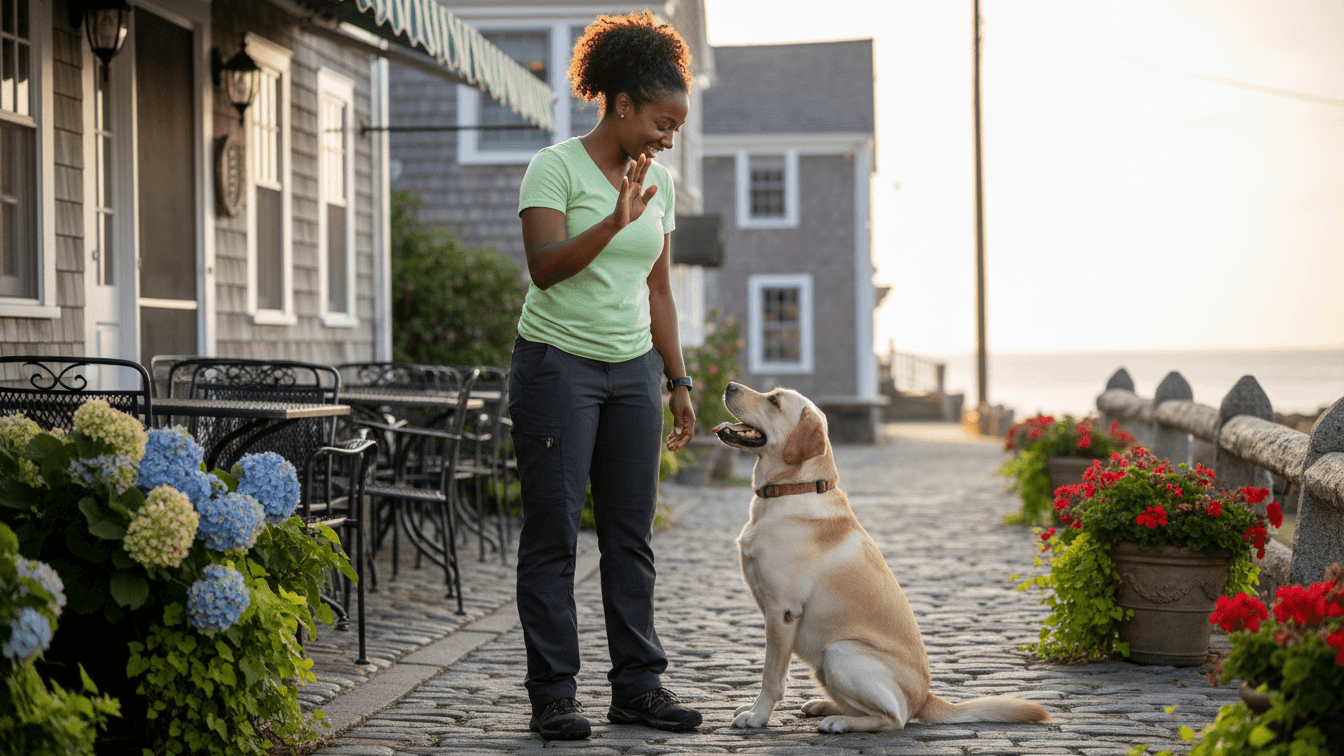Your Complete Guide to Choosing a Dog Trainer in Rhode Island
Living with a dog in Rhode Island means navigating unique challenges, from the dense neighborhoods of Providence to the beach towns along the coast. Your dog needs to handle busy sidewalks, handle encounters with other dogs on narrow streets, and stay calm during summer tourist season when crowds pack downtown areas and waterfronts.
Rhode Island is the smallest state, so most trainers serve multiple communities. Whether you’re in Providence, Warwick, Cranston, or one of the smaller towns, you’ll often find trainers willing to travel throughout the state for in-home sessions.
How to Choose the Right Trainer
Start by looking for someone who uses positive reinforcement training and understands Rhode Island’s mix of urban density and beach access. Your dog should learn to walk calmly through congested neighborhoods, stay focused near restaurants and outdoor dining areas, and behave politely when you encounter tourists and other dogs on narrow sidewalks.
Credentials help you compare trainers and find someone with proven knowledge. Common dog trainer certifications include CPDT-KA, KPA-CTP, and IAABC-CDBC for behavior problems. If your dog shows serious aggression or anxiety, look for someone with CBCC-KA or a science-based program like CTC.
In-home dog training works great for door manners, leash pulling in your neighborhood, and helping reactive dogs feel safer at home. Group classes make sense once your dog can focus around other dogs, especially if you want to practice skills in a controlled setting before trying busy public spaces.
Ask whether the trainer offers a free consultation so you can discuss your goals and see if their approach matches what you need. Professional dog trainers should be willing to explain their methods clearly and help you understand realistic timelines for progress.
Common Dog Training Methods Explained

Reward-based methods build trust while creating lasting behavior changes. They also help you stay within Rhode Island’s animal welfare laws, which protect dogs from unnecessary harm.
Basic obedience covers sit, down, stay, place, recall, and leash training so your dog can handle walks, outdoor dining areas, and park visits without dragging you down the street or jumping on strangers. These skills form the foundation for a well-behaved dog in any Rhode Island community.
Puppy training focuses on socialization, potty training, bite control, crate comfort, and early leash skills. Starting young prevents bad habits from forming and helps your puppy adjust to Rhode Island’s urban environment, loud traffic, and crowded public spaces.
Behavior modification addresses fear, reactivity, resource guarding, or separation anxiety through careful desensitization and counterconditioning. For serious cases, ask if your trainer works with local veterinarians who can rule out medical issues or prescribe medication if needed.
Private lessons let you customize everything around your daily routines and specific challenges. Day training can speed up results when you’re short on time, with the trainer working your dog during the day and then teaching you how to maintain the progress.
Dog training classes help your dog practice good manners around other dogs and people. The best classes give dogs plenty of space, screen participants carefully, and teach calm behavior rather than just excitement and play.
Specialized training like therapy dog training or service dog training requires extra structure, public-access skills, and a very clear step-by-step training program. Make sure your trainer has experience with the specific certification requirements if you’re pursuing these goals.
Stay away from trainers who use fear, intimidation, or pain to get results. Humane methods are safer for everyone, easier to maintain long-term, and much better for keeping peace with your neighbors in Rhode Island’s tight-knit communities.
Average Cost of Dog Training in Rhode Island (Updated for 2025)
Prices across Rhode Island depend on the trainer’s experience, session length, and whether they come to your home. Here’s what most dog owners are paying in 2025.
| Service Type | Average Cost (Rhode Island) |
|---|---|
| Puppy classes (4-6 weeks) | $160-$290 total |
| Group obedience classes (4-6 weeks) | $170-$310 total |
| Private lessons (60-90 min) | $120-$200 per session |
| In-home coaching packages (4-6 visits) | $450-$950 total |
| Day training (trainer works your dog + handoff) | $475-$1,000 per week |
| Behavior consult for reactivity/anxiety (initial) | $160-$275 |
| Board and train (2-4 weeks) | $2,200-$4,800 total |
You’ll probably pay extra travel fees if you live in the more rural western parts of the state, and expect higher rates for complex behavior work involving aggression or severe anxiety.
Make sure you understand what’s included, how the trainer tracks progress, and whether dog training services come with follow-up support after your package ends.
Questions to Ask a Potential Dog Trainer
- What training methods do you use, and how do you keep training sessions positive and low-stress?
- What credentials do you have, like CPDT-KA or KPA-CTP? Do you keep up with continuing education such as CPDT-KSA?
- How will you customize the training program for my dog’s specific needs and our Rhode Island lifestyle?
- Do you offer in-home visits, group classes, or day training, and which approach fits my goals best?
- How will we measure my dog’s progress and know when to add more distractions?
- What are the total costs, including any travel fees, and what’s your cancellation policy?
- Do you carry liability insurance, and can you show me proof?
- For behavior problems, will you work with my veterinarian if needed?
- What should I practice between our sessions to help my dog keep improving?
- Do you offer a free evaluation so we can meet before committing?
Local Rhode Island Rules and Considerations
Rhode Island enforces leash laws and vaccination requirements to keep public spaces safe for everyone. Most municipalities have their own ordinances, but state law provides the baseline.
Leashes are required in all public spaces except inside designated off-leash dog parks. Keep a standard 6-foot leash with you for sidewalks, trails, and beach areas that allow dogs.
Rhode Island law requires current rabies vaccination for all dogs over three months old. Your veterinarian will provide a certificate and tag. More information is available through the Rhode Island Department of Environmental Management.
Excessive barking can be considered a nuisance under local ordinances, so work with your trainer on alert barking and separation anxiety before neighbors start complaining. Many Rhode Island neighborhoods are densely packed, so sound travels easily between homes and apartments.
Rhode Island doesn’t require special licenses for dog trainers, but if a business boards dogs for payment, they must register with the Department of Environmental Management. Expert dog trainers should also carry liability insurance to protect themselves and their clients.
Certified dog trainers aren’t state-regulated, so credentials from national organizations become even more important when choosing a professional.
Local Rhode Island Resources for Dog Owners
These spots give you great places to practice polite manners, work on socialization, and provide safe enrichment for your dog. Always follow posted rules and clean up after your pet.
- Warwick City Park Dog Park offers a large fenced area with separate sections for large and small dogs, making it perfect for training for dogs who need controlled socialization.
- Coventry Dog Park at Hopkins Hill Road provides a spacious off-leash area where you can practice recalls and help your dog build confidence around other dogs.
- Conimicut Point Park in Warwick allows leashed dogs and offers waterfront views, making it a great spot for practicing focus around distractions like seagulls and other dogs.
- Blackstone River Bikeway welcomes leashed dogs and provides miles of paved paths for leash training and building your dog’s endurance.
- East Bay Bike Path stretches from Providence to Bristol and allows leashed dogs, giving you excellent opportunities to practice loose-leash walking through different environments.
Many Rhode Island beaches restrict dogs during summer months, typically from Memorial Day through Labor Day. Check local regulations before visiting, as rules vary by town and beach.

FAQs
How much does in-home dog training cost?
Most Rhode Island trainers charge $120-$200 per in-home visit, with discounts available when you buy packages. Behavior problems typically start at the higher end of that range.
Is in-home dog training worth it?
Absolutely, because you’re working on problems exactly where they happen. Your trainer can fix door manners, jumping on guests, counter-surfing, and yard reactivity right at home, then step outside to practice leash skills on your actual neighborhood sidewalks.
Can you pay someone to house train your dog?
Yes, many trainers offer puppy programs that include potty training, crate routines, and daily schedules. Day training can speed up the process while teaching you how to maintain the progress.
What is the 3-3-3 rule for dog training?
This is a helpful timeline for new or adopted dogs: expect about 3 days for your dog to decompress, 3 weeks to learn your routines, and 3 months to feel completely settled. Good training plans work with this natural adjustment period.
How long will it take to reach my training goals?
Most puppies and friendly adult dogs show solid progress within 4-8 weeks if you practice daily. Fear, reactivity, or aggression typically requires several months of careful behavior modification with gradual increases in difficulty.
What should I bring to group classes?
Pack a flat collar or harness, a 6-foot leash, high-value treats, water, and current vaccination records if your trainer requests them. Leave retractable leashes at home for safety reasons.
What’s the leash law in Rhode Island?
Dogs must be leashed and under control in all public areas, except inside designated off-leash dog parks. Keep that 6-foot leash handy for sidewalks, parks, and any beach areas that allow dogs.
Do I need a dog license in Rhode Island?
Most Rhode Island municipalities require dog licenses, with fees varying by town. Contact your local city or town hall for specific requirements and fees. You’ll typically need proof of current rabies vaccination to get a license.
What shots does my dog need in Rhode Island?
Rabies vaccination is required by state law for all dogs over three months old. Your veterinarian may also recommend distemper-parvo and bordetella based on your dog’s lifestyle. The Rhode Island Department of Environmental Management oversees rabies regulations.
Are dog trainers required to be licensed in Rhode Island?
No special trainer licenses exist in Rhode Island. Trainers follow normal business regulations, but if they offer board and train services, their facility must be registered with the Department of Environmental Management as a boarding kennel.
Where can I practice off-leash recall?
Use fenced dog parks like Warwick City Park Dog Park or Coventry Dog Park to keep things safe and legal. Try visiting during quieter hours when you’re starting out so your dog can focus better.
Which dog parks allow training around Rhode Island?
Warwick City Park Dog Park, Coventry Dog Park, and Newport Dog Park all allow off-leash play within their fenced areas. These spaces work well for practicing recalls, socialization, and building your dog’s confidence.
What beaches or trails allow dogs for training?
Many Rhode Island beaches restrict dogs during peak summer season, but several allow leashed dogs during off-season months. Scarborough State Beach, Roger Wheeler State Beach, and East Matunuck State Beach typically allow dogs after Labor Day. The Blackstone River Bikeway and East Bay Bike Path welcome leashed dogs year-round and offer excellent opportunities for leash training and building focus around cyclists, joggers, and other distractions.
What kind of aggressive dog training is available in Rhode Island?
Rhode Island trainers who specialize in behavior modification can help with fear-based reactivity, leash aggression, and other concerning behaviors. Look for trainers with advanced certifications in behavior consulting who use desensitization and counterconditioning rather than punishment or confrontation.
How do I find the best dog training for my needs?
Start by identifying your specific goals, whether that’s puppy classes, dog obedience training, or help with separation anxiety. Then look for trainers with relevant certifications and experience who offer a free consultation. Ask about their methods, read reviews, and make sure their communication style works for you before committing.
The right combination of thoughtful planning, humane methods, and consistent practice around Rhode Island’s parks and neighborhoods will help your dog become a confident, well-behaved companion. Whether you’re in a Providence triple-decker or a Narragansett beach cottage, working with a qualified trainer who understands local challenges makes all the difference.
